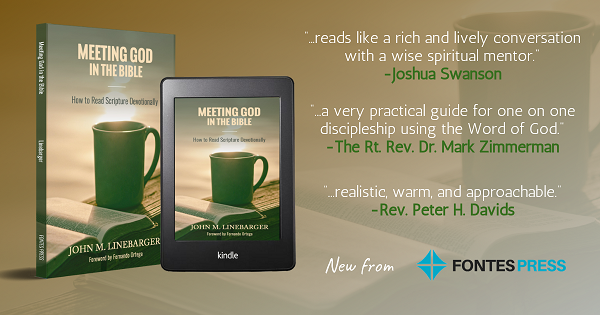
Having explained elsewhere the ACTS pattern of adoration, confession, thanksgiving, and supplication, it will be helpful to see what a time of prayer using the ACTS model would look like. In John Linebarger’s creative Meeting God in the Bible, which teaches spiritual disciplines through narrative, we get a brief description of Victoria’s first attempt at using the ACTS model for prayer. Let’s read:
A couple of nights later Victoria finally was able to slow down and have a Quiet Time. She was exhausted, both physically and emotionally, because of the hectic pace at work and the health situation with her mother. As she collapsed on the couch, she tried to remember what Sharon had told her the other night at the coffee shop. “Oh yeah,” she said to herself. “I need to start with the first two parts of an ACTS Prayer and end with the last two parts.” She closed her eyes and began to pray.
“God, I’m not quite sure how I should adore you in prayer. Thank you for coming into my heart and changing my life.”
“Wait,” she thought. “That’s a thanksgiving. I’m not supposed to do that until the end, right? It probably doesn’t matter. But how do I adore God in prayer?”
She opened her eyes. As she looked for her Bible, she remembered what Sharon had texted her in reply when she had asked a question about ACTS Prayer. She said that you adored God for who he is but thanked him for what he has done. Since Sharon had recommended the last few psalms as examples of adoration, Victoria went straight to the very end of the book, hoping that Psalm 150 was as good an example as any.
Praise the Lord!
Praise God in his sanctuary;
praise him in his mighty heavens!
Praise him for his mighty deeds;
praise him according to his excellent greatness!
Praise him with trumpet sound;
praise him with lute and harp!
Praise him with tambourine and dance;
praise him with strings and pipe!
Praise him with sounding cymbals;
praise him with loud clashing cymbals!
Let everything that has breath praise the Lord!
Praise the Lord! (Ps 150)
She couldn’t quite decide whether the praise in this psalm was an example of adoration or thanksgiving; it seemed to be a mixture of both. But with Psalm 150 before her, she resumed her prayer. “God, I adore you because you are the Creator of the world. I adore you together with all your people. I adore you both for who you are and for what you have done. I adore you loud and proud. And not only do your people adore you, but everything that you have made adores you.”
Victoria stopped, because she knew what was coming next. Confession always made her uncomfortable, even when she was alone with God. And sometimes, like this evening, she had a lot to confess. She took a deep breath and plunged in.
“God, I’m sorry for going off on Belinda today at work. She makes me so mad! Always ordering people around even though she’s not the boss. But I shouldn’t have spoken to her that way, especially using the words that I did. I simply can’t imagine trying to share my faith with her right now; what would she think? Would she even want to be a Christian if she thought I was a typical example? Anyway, please help me to watch my mouth. Please work in Belinda’s life too, and make her less bossy. Even though I’ve probably been a lousy witness, please help her come to know you as her Savior. Please don’t let me blow my witness with Sofía, who needs you in her life really badly right now. And please keep me from worrying so much about my mom. Help me to trust that you are in control of everything and that everything that happens is intended for our good. Amen.”
Victoria was aware that her opening prayer ended up with some supplications in it, but at least it was more balanced than most of her prayers tended to be. On to the Quiet Time. She had already picked the passage she wanted to read. Her friend Jennifer had recommended it to her because she knew that Victoria was so anxious about her mother’s health. “Psalm 23 is one of my favorite psalms when I’m worried and need comfort,” Jennifer had said. “It’s a pretty famous one, too.” Victoria turned back a little in her Bible and found Psalm 23.
The Lord is my shepherd; I shall not want.
He makes me lie down in green pastures.
He leads me beside still waters. He restores my soul.
He leads me in paths of righteousness for his name’s sake.
Even though I walk through the valley of the shadow of death,
I will fear no evil, for you are with me;
your rod and your staff, they comfort me.
You prepare a table before me in the presence of my enemies;
you anoint my head with oil; my cup overflows.
Surely goodness and mercy shall follow me all the days of my life,
and I shall dwell in the house of the Lord forever (Ps 23).
Victoria read it through several times and could feel peace washing over her. No wonder the psalm was so well-known. “Let’s see; what does this psalm tell me about God?” she asked herself. “It says that God is a shepherd who cares for every need of his sheep and leads his sheep in the direction of things that are good for them. He comforts and protects his sheep in times of danger. Not only does he provide for their basic needs but he also blesses them publicly in front of enemies who want to take the blessing away. Because of God’s care for them, sheep who follow God as their shepherd enjoy goodness, mercy, and security for their entire life.”
“So far so good,” she thought. “What does this psalm tell me about myself? It tells me that I am a sheep who needs to follow the lead of God as my shepherd, and who needs to trust him to comfort me, protect me, and provide for me.” Her mind leaped ahead to the final question. “With God’s help, how should my life be changed so that I can become more like God?” She reviewed the psalm for a minute or two. “Well, what I need to do to become that person in the psalm, that sheep who calmly trusts God, is to really live out that trust when times get rough, instead of just talking trust. I need to have faith that my mom is in God’s hands instead of obsessing about her health and worrying about her constantly. I need to relax when people bother me at work, and trust that in the end God will defend me so that I’m not always thinking I have to defend myself. Above all, I need to truly believe in God’s goodness and mercy instead of being consumed by fear and anxiety. And I need God’s help for all these things because I can’t do them by myself.”
Victoria yawned a little and looked at the clock. Time for bed; it had been a tough day, but this was a nice way to end it. She had noticed that a Quiet Time and prayer before bed often prepared her for a night of undisturbed sleep. “OK, let me end with the ‘T’ and ‘S’ parts of the prayer,” she said to herself. “God, I thank you for what you have shown me in this psalm, that you are a gentle shepherd who cares for me and protects me and wants to comfort me. Please help me to trust that you care for my mom too, and please keep her lump from being cancerous. And help me either to keep my mouth shut at work when I feel provoked, or to say gentle words to make the situation better instead of harsh words to make the situation worse. In Jesus’ name, Amen.” With that, she switched out the lights and went into her bedroom.
This example of ACTS prayer is taken from Meeting God in the Bible by John Linebarger (Fontes, 2019), ch. 6. Read further about ACTS prayer here.


